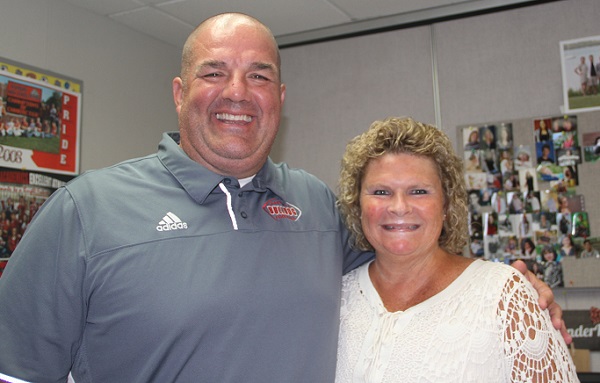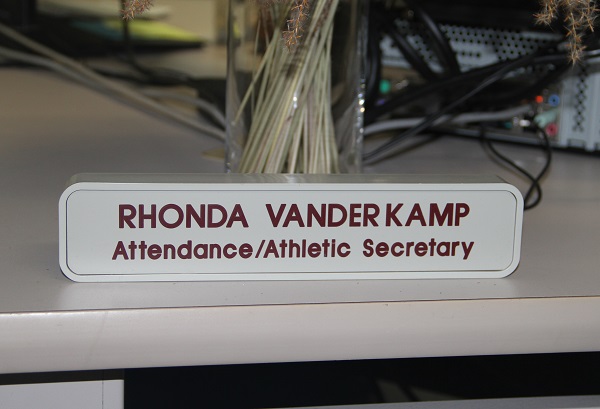
Indispensable Only Begins to Describe Vicksburg Athletics 'MVP' VanderKamp
By
Pam Shebest
Special for MHSAA.com
September 20, 2022
VICKSBURG — Reading, traveling, enjoying time with family and sitting by the pool are all on Rhonda VanderKamp’s retirement list.
 But before she embarks on that journey in June, she is finishing her 21st year as Vicksburg High School athletic secretary.
But before she embarks on that journey in June, she is finishing her 21st year as Vicksburg High School athletic secretary.
One person not looking forward to that June day is Vicksburg athletic director Mike Roy.
“I keep waking up every day coming to work, and maybe she’ll tell me I’m going to do one more (year),” Roy said.
“Like the Tampa Bay Buccaneers when Tom Brady retires, they’re going to dearly miss him. That’s the best analogy I can give; that’s how important she is to the team we have here.”
Roy should know.
The two have worked together all 21 years, forming a work family that’s become an anomaly in the world of high school athletics.
Her own family is the reason VanderKamp landed at Vicksburg.
She left her job at Heco, formerly Hatfield Electric, in Kalamazoo, after 17 years because “I wanted to be on the same schedule as what my kids were,” she said. “This allowed me to have my summers off with them and Christmas and spring breaks. It’s been just fantastic.
 “Both of them were athletes in school. My daughter was in middle school when I started. I think it was good for them to have me here when they were in high school.”
“Both of them were athletes in school. My daughter was in middle school when I started. I think it was good for them to have me here when they were in high school.”
VanderKamp and Roy were hired into the athletic department within a month of each other.
She realizes how unusual their tenure is when she attends conferences.
“They’ll ask you to stand up, introduce yourself and say what school you’re from, how many years you’ve been an athletic secretary and how many athletic directors you’ve been through,” she said.
“It’s always such pride for me to say I’ve been an athletic secretary ‘X’ amount of years and I’ve only had one athletic director. That’s just not heard of these days.”
Roy, always quick with a quip, looked back at their first year working together.
“I told her from Day One: I’m like a new husband. You train me the way you need me to be,” he laughed.
He then got serious: “She’s the MVP. There’s so much stuff that gets done in this office behind the scenes, and it’s all because of Rhonda VanderKamp.”
Roy is not the only one calling VanderKamp “MVP.”
Seven-year wrestling coach Jeff Mohney echoes that sentiment, noting that his wrestlers call her Mrs. Rhonda or Mrs. V.
“She has never told me ‘no, I don’t have time for that,’” he said. “She handles everything from contracts, referee fees, cancelations, and student-athlete eligibility. She knows every student at Vicksburg and most of their parents.
“What separates her from others is her commitment to the coaching staff and the student-athlete. She is family-driven and lets us be a part of that. She shares stories of her family and asks about ours as well.”
Mohney said one portion of their tenures together stands out in his mind.
“Her commitment to us was not more evident than when masks were required at school,” he said. “We didn’t see her face for over a year. She was trying to keep her families safe to the best of her ability.
 “Now the highlight of my day is seeing Mrs. Rhonda’s smile. Vicksburg wrestling would not be relevant without Mrs. Rhonda’s commitment to us.”
“Now the highlight of my day is seeing Mrs. Rhonda’s smile. Vicksburg wrestling would not be relevant without Mrs. Rhonda’s commitment to us.”
One of VanderKamp’s proudest achievements during her 21 years was the addition of 10 varsity sports: hockey, equestrian plus boys and girls clay target, bowling, lacrosse and skiing.
In addition to her athletic secretary duties, she is also in charge of coordinating attendance and discipline.
“All the sick kids, the late kids, the kids who need to leave early all come through my office,” she said.
“Discipline also comes through my office, although I have help with that now.”
Her typical day begins about 7 a.m., and she is usually greeted by the ringing of phones.
“The kids are coming in with notes they have to get out early, parents are calling for sick children, I’m listening to (phone) messages,” she said.
“Once school starts, it’s constant activity. I always make sure I confirm my refs scheduled for that day, make sure my rosters are ready to go.
“Mike always double checks transportation. It’s a cycle. You just know what needs to be done, and you go with it.”
She said the job has also become a lot busier with the additional sports including “entering every athlete into the athletic software, making sure they’re all getting their awards, keeping on top of coaches when they add athletes, submitting pictures once I receive them onto our website and to boosters so we can print a booklet for each season.”
Time to travel abroad
The travel part of her retirement will include a trip to the Netherlands to visit Suzan Hauwert, who lived with the VanderKamps during the 2001 school year, and to Germany to visit Annika Busch, who lived with the family in 2003. Both were exchange students.
In addition, “My husband spoke Dutch before he spoke English, so his parents came right over on the boat,” the soft-spoken VanderKamp said.
Her husband, Gerrit, was in the U.S. Army and stationed in Germany, so they also plan to visit some of his old bases.
While VanderKamp has never visited Europe, both exchange “daughters” have been back to Vicksburg several times to visit.
 “Both were in my daughter’s wedding five years ago,” she said. “They’ll join us on vacations or come to visit. It’s such an intense bond we share with them.”
“Both were in my daughter’s wedding five years ago,” she said. “They’ll join us on vacations or come to visit. It’s such an intense bond we share with them.”
She also is looking forward to spending more time with 2-year-old granddaughter Presley, who lives in Portage with parents Andrea (VanderKamp) and Michael Prior.
Son Robert, and his wife, Shelby, live in Kalamazoo.
While she expects to leave her job in June, she said she does not need a lot of praise or attention – but deservingly is receiving it.
One of those praising her is Vicksburg’s 16-year volleyball coach Katrina Miller.
“Rhonda is a miracle worker” Miller said. “I swear she can do it all!
“As far as impacting my sport, it’s always nice for me to know that things are in order with my team and their paperwork and information.
“I have emailed her at odd hours looking for copies of physical forms or eligibility for tryouts and she is always right on it. She is going to be very missed, but we are happy that she will be able to have some time with herself and with her family.”
While her daily job may be over in June, VanderKamp and the Bulldogs will see each other again.
“I love the kids, I love my co-workers,” VanderKamp said. “I plan to sub if they need me in the office, so it’s not really goodbye. It’s ‘See you around.’”
 Pam Shebest served as a sportswriter at the Kalamazoo Gazette from 1985-2009 after 11 years part-time with the Gazette while teaching French and English at White Pigeon High School. She can be reached at [email protected] with story ideas for Calhoun, Kalamazoo and Van Buren counties.
Pam Shebest served as a sportswriter at the Kalamazoo Gazette from 1985-2009 after 11 years part-time with the Gazette while teaching French and English at White Pigeon High School. She can be reached at [email protected] with story ideas for Calhoun, Kalamazoo and Van Buren counties.
PHOTOS (Top) Rhonda VanderKamp sits at her desk as she begins her 21st year in the Vicksburg athletic department. (2) VanderKamp has worked all 21 years alongside athletic director Michael Roy. (3) The VanderKamp family, from left: son Robert VanderKamp, daughter-in-law Shelby VanderKamp, son-in-law Michael Prior, granddaughter Presley Prior, daughter Andrea Prior, Rhonda VanderKamp, husband Gerrit VanderKamp and father Bob Rainwater. (4) Rhonda VanderKamp has welcomed thousands of students during her time as athletic and attendance secretary. (Top two and bottom photos by Pam Shebest; family photo courtesy of Rhonda VanderKamp.)

Regulation with Roots
December 3, 2015
By Jack Roberts
MHSAA Executive Director
The following is an excerpt from “History, Rationale and Application of the Essential Regulations of High School Athletics in Michigan.”
Throughout the years, schools of this and every other state have identified problems relating to school transfers.
There is recruitment of athletes and undue influence. There is school shopping by families for athletic reasons. There is jumping by students from one school to another for athletic reasons because they couldn't get along with a coach or saw a greater opportunity to play at another school or to win a championship there. There is the bumping of students off a team or out of a starting lineup by incoming transfers, which often outrages local residents. There is the concentration of talent on one team by athletic-motivated transfers. There is friction between schools as one becomes the traditional choice for students who specialize in a particular sport. There is imbalance in competition as a result. And there is always the concern that the athletic-motivated transfer simply puts athletics above academics, which is inappropriate in educational athletics.
All states have developed rules to address the problems related to school transfers. In some states it is called a transfer rule and in other states a residency rule, because linking school attendance to residence is one of the most effective tools for controlling eligibility of transfers. None of the state high school association rules is identical, but all have the intention of preventing recruiting, school shopping and jumping, student bumping, friction, imbalance and overemphasis, as well as the intention of promoting fairness in athletic competition and the perspective that students must go to school first for an education and only secondarily to participate in interscholastic athletics.
The transfer/residency rule is a legally and historically tested but still imperfect tool to control athletic-motivated transfers and other abuses. It is a net which catches some students it should not, and misses some students that should not be eligible. This is why all state high school associations have procedures to review individual cases and grant exceptions; and why all state high school associations have procedures to investigate allegations and to penalize violations where they are confirmed.
Over the years, state high school associations have considered four options to handle transfers. The first two options are the easiest courses: either (1) let schools decide themselves about transfers, as Michigan once did, but this leads to inconsistent applications and few states now subscribe to such an approach; or (2) make no exceptions at all, rendering all transfer students ineligible for a period of time, but this becomes patently unfair for some students and no state high school association subscribes to that extreme, although it would be easy to administer.
The third option – the ideal approach perhaps – would be to investigate the motivation of every transfer and allow quicker eligibility or subvarsity eligibility to those which are not motivated by athletics, but this is very time consuming if not impossible to administer. No state high school association has sufficient staff and money to consider every detail of every transfer.
This is why a fourth option has been most popular with most state high school associations. This is a middle ground which stipulates a basic rule, some exceptions (15 exceptions in Michigan), and procedures to consider and grant waivers (a primary role of the MHSAA Executive Committee).
It is certain that the MHSAA transfer rule is imperfect. However, whatever few imperfections exist are remedied through a process by which member school administrators may make application to the MHSAA Executive Committee to waive the rule if, in the committee's opinion, the rule fails to serve any purpose for which it is intended or in its application creates an undue hardship on the student. In a typical year, the Executive Committee will receive approximately 250 requests to waive the transfer regulation, approving approximately 60 percent of those requests.
The committee brings to its considerations the following rationale, most recently reviewed and reaffirmed on Aug. 5, 2015:
- The rule tends to insure equality of competition in that each school plays students who have been in that school and established their eligibility in that school.
- The rule tends to prevent students from “jumping” from one school to another.
- The rule prevents the “bumping” of students who have previously gained eligibility in a school system by persons coming from outside the school system.
- The rule tends to prevent interscholastic athletic recruiting.
- The rule tends to prevent or discourage dominance of one sport at one school with a successful program, i.e., the concentration of excellent baseball players at one school to the detriment of surrounding schools through transfers and to the detriment of the natural school population and ability mix.
- The rule tends to create and maintain stability in that age group, i.e., it promotes team stability and team work expectation fulfillment.
- The rule is designed to discourage parents from “school-shopping” for athletic purposes.
- The rule is consistent with educational philosophy of going to school for academics first and athletics second.
- It eliminates family financial status from becoming a factor on eligibility, thus making a uniform rule for all students across the state of Michigan (i.e., tuition and millage considerations).
- It tends to encourage competition between nonpublic and public schools, rather than discourage that competition.
- It tends to reduce friction or threat of students changing schools because of problems they may have created or because of their misconduct, etc.
Following the adoption of a more standardized statewide transfer rule in 1982, there were multiple legal challenges. However, in 1986, the Michigan Court of Appeals determined that a rational basis exists for the transfer regulation and that the rule, with its exceptions, is not overbroad and is neither arbitrary nor capricious, noting that neither a fundamental right nor suspect classification is involved. Berschback v. Grosse Pointe Schools 154 Mich App 102 (1986). That decision is also noteworthy for this statement which has halted or decided subsequent legal challenges: “This Court is not the proper forum for making or reviewing decisions concerning the eligibility of transferring students in interscholastic athletics.”
There were two major changes in the MHSAA transfer regulation during the 1980s. The first, the athletic-motivated transfer rule, led to the busiest period of litigation in the MHSAA’s history. The other major change, arguably of equal impact, was implemented without any controversy.
This second subtle but substantial change occurred in 1987 when language was adopted to limit eligibility after a transfer to the non-public school closest to the student’s residence, as opposed to any non-public school in whose service area the student lived. “Service area” did not have a consistent definition and created unnecessary concern that non-public schools had the advantage of huge, undefined attendance areas, compared to public school districts at that time.
Some high school associations prescribe geographic boundaries or mileage limitations for students transferring to non-public schools. Michigan simply says it’s only the non-public school closest to the student’s residence, where eligibility may be immediate.
PHOTO: The MHSAA Transfer Regulation dates back to the early 1980s when the Association building stood on Trowbridge Road in East Lansing.

